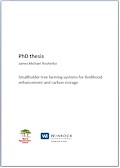| Thesis |
 |
|
| Title | Smallholder tree farming systems for livelihood enhancement and carbon storage | | Author | James M Roshetko | | Year | 2013 | | Academic Departement, University | World Agroforestry Centre - ICRAF, SEA Regional Office, Winrock International and Faculty of Life Science, University of Copenhagen, Denmark | | City | Frederiksberg, Denmark | | Number of Pages | 205 | | Departement | Department of Geosciences and Natural Resource Management, University of Copenhagen, Frederiksberg | | Degree | PhD | | Call Number | TD0173-13 |
|
| Abstract: |
| Smallholder agroforestry (tree farming) systems are prominent components of ‘trees outside the forest’. They are primarily ‘planted’ systems that rehabilitate or reforest marginal lands, both private and public, where crop production is no longer biophysically or economically viable. While smallholder agroforestry systems vary greatly, most are tree-rich, species-rich systems that produce agricultural and tree products for both home use and market sale. The market orientation of smallholder systems has strengthened greatly over the last 10 to 20 years. Local, national and international markets are all supplied by smallholder agroforestry systems. Smallholder systems produce 90% of the global production of cacao, three-quarters of rubber, two-thirds of coffee, approximately 40% of oil palm and 25% of tea. Smallholder systems also provide valuable environmental services, including soil fertility replenishment, watershed protection, carbon sequestration, biodiversity conservation and land rehabilitation.
The hypothesis of this thesis is that smallholder tree-farming systems are viable agricultural and natural resources management systems that contribute significantly to global environmental goals and local economic objectives. The thesis supports the hypothesis by reviewing global and Asian trends of deforestation, human population growth, and demand for forest and tree products. The potential of smallholder tree-based systems to expand regional forest resources, produce forest products and services, and contribute to local livelihoods for rural communities is reviewed. Strategies to transform traditional smallholder systems into market-oriented systems to better serve environmental and economic goals are also assessed.
The five papers included in the thesis specifically address the capacity of smallholder systems to store carbon; the appropriateness of smallholder systems for carbon projects; the types of technical assistance and enabling conditions that facilitate the successful development of smallholder systems; how genetic diversity of smallholder systems supports adaptation to climate change; and the capacity of smallholder systems to simultaneously produce marketable timber and agricultural crops.
Most of the research presented in this thesis was conducted in Indonesia and the Philippines. However, the results and conclusions are applicable to the wide range of biophysical and socioeconomic conditions under which smallholder agroforestry systems are found in Southeast Asia and throughout the tropics. The discussion and assertions of the thesis are supported with relevant literature, including the candidate’s past and ongoing research. The thesis concludes with recommendations for future work required to strengthen the recognition of smallholder tree-based systems as important contributors to global environmental goals and local economic objectives. |
|